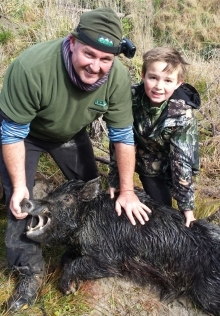___Robert_Whitehouse_(Pilot)_.jpg)
Dave Mahr (shooter) and Robert Whitehouse (pilot).
Terms like World War Three and the Wild West roll off Bob Speak’s tongue when he talks about deer recovery operations in the 1970s and '80s.
Men, sometimes rather wild ones, made good money from deer, dead or alive. But in the process many men were also killed. Helicopters, with shooters on board, fell from the sky at an alarming rate.
That wasn’t enough to put them off, but Bob, who drove a truck to take the deer to an Opotiki meat works, says eventually the market for both farmed deer, where the live captured animals ended up, and the wild meat exports fell away, and he moved into other work.
Now, well over a decade later he has found himself back working with wild deer, and he’s loves it. This time he’s driving a truck for Raukumara Red NZ Wild Venison.
_and_Bob_Speak_(Truck_driver).jpg)
Ross Wordsworth (carcass presentation) and Bob Speak (truck driver).
Red deer are sourced from the Raukumara Ranges, and Bob drives them, in carcass form, to a Feilding meat works each week. He does nearly a thousand kilometres over two days, and his day may start at 4.30 am, and end at 10pm, depending in what part of the country the deer are shot.
“But I love it. See lots of country. I love working with deer” he says.
 Raukumara Red has been operating for nearly four years. Owner Adam Finlayson (right) says it’s been a logistical challenge getting the supply chain going, but now he has supermarkets and top end restaurants prepared to pay a good price for premium meat .
Raukumara Red has been operating for nearly four years. Owner Adam Finlayson (right) says it’s been a logistical challenge getting the supply chain going, but now he has supermarkets and top end restaurants prepared to pay a good price for premium meat .
“It’s taken a huge financial resource, and mental resource”, he says laughing. “But I wake up each day excited about what’s ahead.”
Two to two and a half thousand deer a year are taken from the wild by his company, but he says there are still plenty out there for recreational hunters. “Without us DOC land would be overrun with deer,” he says.
A percentage of every kilo of meat sold is donated to the Whinray Ecological Trust which runs a kiwi release programme in the Gisborne region.

